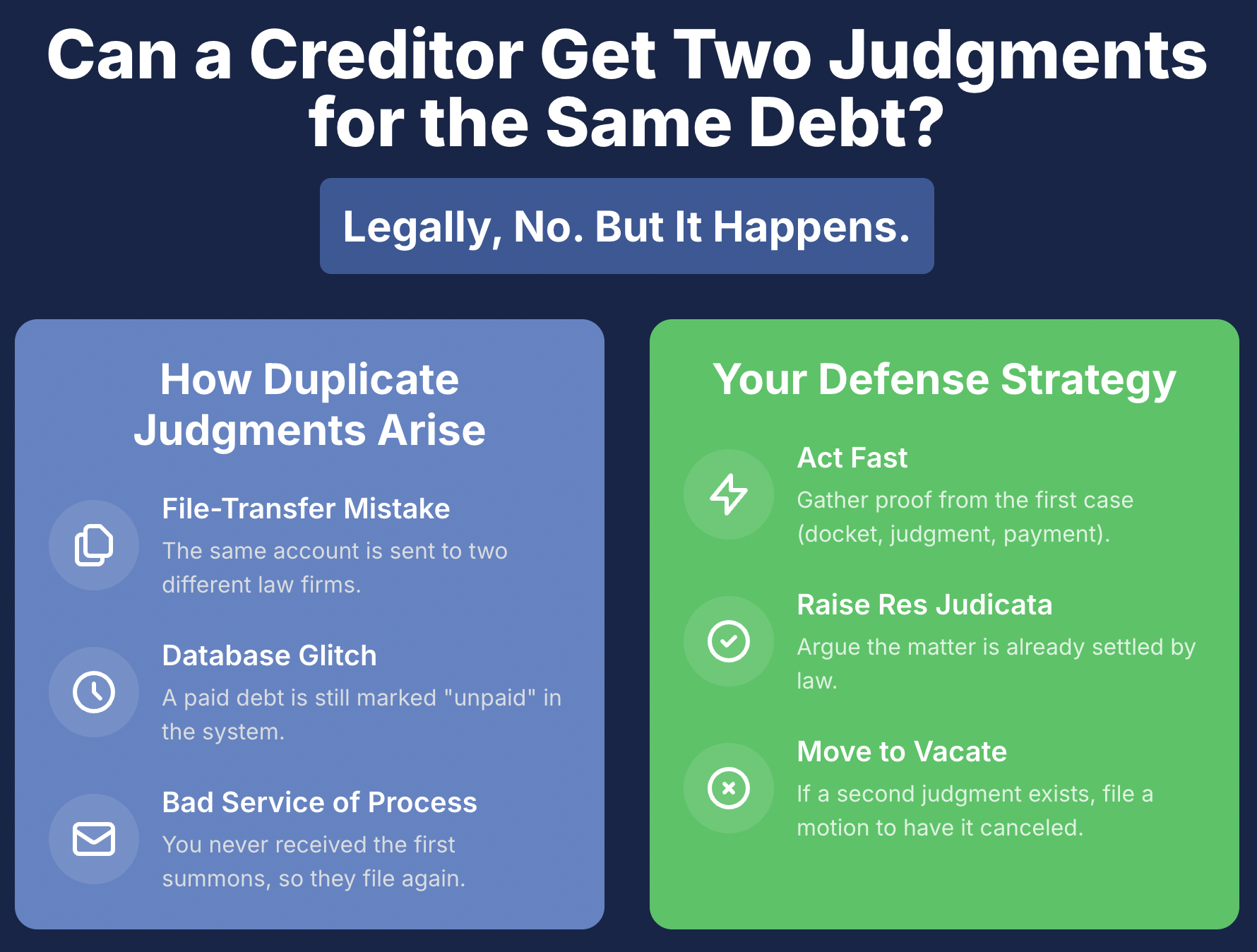Double Garnishment After Judgment Satisfaction: A Case Study
Client problem
After a default judgment and a full wage-garnishment payout, our client thought the matter was closed. Three years later he received a second garnishment notice—same creditor, different law firm—for almost the identical amount.
Timeline
Year 0: The creditor filed an affidavit claiming service, but our client never actually received notice — a common problem with default judgments. They immediately began wage-garnishing our client until the entire balance was paid.
Year 3: Three years later, a different law firm—acting for the same creditor—sent a fresh garnishment notice for almost the identical amount.
Within two weeks: We stepped in, documented that the judgment had already been satisfied, and compelled the creditor to withdraw the second garnishment.
Outcome
In this case, we resolved the problem in under two weeks — results depend on the facts, court schedules, and creditor behavior
All improper collection activity stopped
Client reimbursed for fees withheld after the judgment was already satisfied

If you need help, complete this intake form.
Can a creditor get two judgments for the same debt?
Generally, courts will not allow a second lawsuit on the same debt between the same parties — but limited exceptions exist, so each case requires review.
How duplicate judgments arise:
| How it goes wrong: | What it looks like in practice: |
|---|---|
| File-transfer mistake: | The creditor sends the same account to two different law firms. |
| Database glitch: | The debt is marked “unpaid” in one system even after the first judgment is satisfied. |
| Bad service of process: | Bad service of process is more likely to lead to continued litigation in the original case — but occasionally it results in a mistaken second filing. |
If nothing is done, each lawsuit can end in a default judgment—leaving you with two enforceable judgments for one balance.
Your defense strategy
Act fast. As soon as you spot a second suit, gather the first case’s docket, judgment, and proof of payment.
Raise Res Judicata. In your answer or motion, argue that the issue was already adjudicated.
Move to vacate. If the court has already entered a second default judgment, file a motion to vacate it.
Consult a debt-defense attorney. Duplicate-judgment cases are winnable, but deadlines are short and procedures vary by county.
Bottom line: A second judgment on the same debt is usually improper and can often be vacated through motion practice. With prompt action—and the right legal arguments—you can usually wipe out the duplicate case entirely.

What New Yorkers Should Know When Dealing with Creditors
In New York, creditors (or people working for them) can't:
- Collectors generally may not contact your employer about a debt except in limited situations (for example, when enforcing a lawful income execution or when permitted for basic location information).
- Threaten to do something they usually wouldn't or can't do.
- Interest and fees may only be added when authorized by the contract, a court order, or applicable law — including statutory post-judgment interest.
- Make it seem like they're part of the legal system or a government agency.
- Bother you or your family too often or at strange hours.
From Lawsuit to Garnishment: 3 Points to Know
- If faced with a debt collection lawsuit, ensure you respond personally or through an attorney to safeguard your rights by the specified date.
- Private creditors generally need a judgment to garnish, but certain goveMost private creditors must first obtain a court judgment. Some government agencies may garnish administratively — but they must follow notice and appeal procedures and are subject to special limits—such as the U.S. Department of Education—may garnish wages administratively without going to court.
- While many federal benefits are protected from garnishments, there are exceptions like delinquent taxes, child/spousal support, or student loans. Social Security and many VA benefits are broadly protected, with narrow exceptions (like federal tax, child support, and some federal debts). How funds are deposited and identified can affect protection; federal student-aid funds are normally applied to tuition rather than garnished.
Dealing with Aged Debts: The "Statute of Limitations"
- Although debts don't typically vanish, there's a limited time for collectors to sue you, known as the "statute of limitations." Once this period expires, the debt becomes "time-barred."
- The length of the statute of limitations varies depending on the debt type and relevant state laws. In some states, acknowledging or making a payment can reset this timer.
- Suing — or threatening to sue — on a time-barred debt violates the FDCPA and may create liability. Collectors may still contact you in some states, but they must not mislead you about your legal risk. If you want them to stop, send a written request and consider using certified mail for record-keeping.
For a list of 50 other types of debt-collection violations, click the below:


Quiz Questions (Pursued for the Same Debt Twice)
What legal principle prohibits bringing up a new case for a previously decided cause of action? A. Double Jeopardy B. Res Judicata C. Due Process D. Habeas Corpus
What action is a creditor NOT permitted to take against a debtor in New York before securing a court victory? A. Sending a letter of demand B. Discussing the debt with the debtor's family C. Disclosing the debt to the debtor's employer D. Imposing additional fees beyond the owed amount
Upon facing a second lawsuit for the same debt, what is the essential first step? A. Immediately settle the debt to prevent legal consequences B. Contact the creditor to negotiate a deal C. Compile all documents related to the original debt and its settlement D. Publicly protest against the creditor's actions
If you're sued twice for the identical debt, whom should you seek advice from? A. A bankruptcy lawyer B. A debt consolidation agency C. A consumer rights attorney D. The court clerk
Before garnishing wages or bank accounts, what must creditors legally secure? A. A debtor's confession B. An arbitration award C. A judge's signature D. In most private cases, a court judgment is required — but some government agencies may garnish or offset without going to court
Which of the following is generally safeguarded against garnishment? A. Bank savings B. Social Security benefits C. Personal assets like jewelry D. Rental income
What does making a payment or acknowledging an old debt do in certain jurisdictions? A. Clears the debt immediately B. Restarts the statute of limitations C. Decreases the debt by half D. Transfers the debt to a new creditor
Answer Key
- B. Res Judicata
- C. Disclosing the debt to the debtor's employer
- C. Compile all documents related to the original debt and its settlement
- C. A consumer rights attorney
- D. A court order/judgment
- B. Social Security benefits
- B. Restarts the statute of limitations
If you are in a similar situation, call The Langel Firm today at (888) 271-7109 or complete this intake form.


